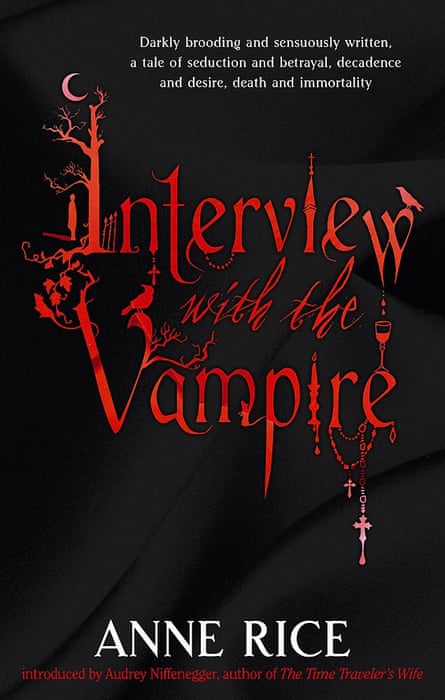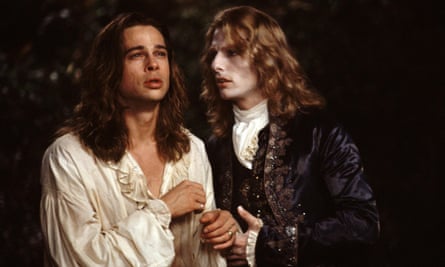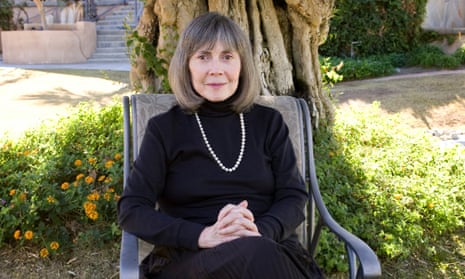Anne Rice, who has died aged 80 after a stroke, was one of the foremost writers of supernatural fiction, and the author of more than 30 novels. The best known of them was her debut, Interview With the Vampire, published in 1976, and adapted in 1994 into a film starring Tom Cruise, Brad Pitt and Kirsten Dunst.
Her work became synonymous with deep, romantic portrayals of vampires, witches and revenant mummies and she was one of the first authors to turn the trope of supernatural creatures as monsters to be vanquished on its head, and put them in the role of protagonist, paving the way for later writers such as Stephenie Meyer and her Twilight saga.
Interview With the Vampire introduced Rice’s most enduring character, Lestat de Lioncourt, an 18th-century French nobleman whose story formed the basis of what would become known as The Vampire Chronicles, a series of 13 books, with the most recent, Blood Communion, published in 2018.
To borrow the title of Rice’s third Lestat book (filmed, with Aaliyah in the title role), the writer was indeed the Queen of the Damned, not necessarily turning into heroes the characters who had previously been the villains of horror fiction, but rather giving them a voice, and presenting their stories from the viewpoint of a different morality.

She plumbed the depths of her own grief and terrors to write, saying in a Rolling Stone interview in 1995 that, “I think all my writing has been part of a battle with my fears. When I write I explore my worst fears, and then take my protagonist right into awful situations that I myself am terrified by. And I think that the act of putting all that fear and terror and confusion into an orderly, plotted story has been very therapeutic for me. It definitely helps me to continue through life.”
Rice said that fantasy writing allowed her to talk about her own life whereas writing a “realistic novel” would be too raw. She said, “You can put the most horrible things into a frame, and you can go into that frame safely and talk about those things. You can go into the world of Louis and Lestat and Claudia, and be able to talk about grief or loss or survival, and then come back safely.”
She wrote like a time traveller, layering especially the Lestat novels with astonishingly evocative period detail. And she did not confine herself to vampires. The Mayfair Witches series, beginning with The Witching Hour (1990), set in Rice’s native New Orleans, concerned itself with a trio of occult practitioners and the demon that bedevils them. The two books of the Wolf Gift series are about lycanthropy, while The Mummy (1989) revitalises the classic horror movie staple. A second mummy novel, Ramses the Damned (2017) was written by Rice with her son, Christopher, and a third collaboration– what will be Rice’s last book – is scheduled for 2022.
Born in New Orleans, Rice was the second of five daughters of Kay (nee Allen) and Howard O’Brien. Her father served with the US navy and then for the US postal service, and both parents were of Irish Catholic heritage. She reportedly hated her name, Howard, and changed it to Anne in the first grade at school. Her mother died in 1956, when Anne was 15, from the effects of alcoholism and the family moved into the former home of her maternal grandmother, who had also died with an alcohol problem.
Rice has said that she was inspired to be a writer by her father who, returning from the second world war and realising he barely knew his infant daughters, Anne and her sister, Alice (the novelist Alice Borchardt), wrote a novel, The Impulsive Imp, for them. Anne was educated first at St Joseph’s academy, a private girls’ school in New Orleans, and later at Richardson high school in north Texas, after her father remarried in 1957 and relocated the family.

After completing a year’s higher education at the Texas Women’s University in Denton, and a sophomore year at North Texas State College, Anne dropped out, unable to afford the tuition fees, and moved to San Francisco, where she took night classes and began her nascent writing career.
She had met Stan Rice at Richardson high school and they rekindled their relationship, marrying in 1961. They settled in the Haight-Ashbury district of San Francisco, living through the growing hippy counterculture years, though Rice once said she was a “square” who locked herself away to write while everyone around her was “dropping acid and smoking grass”.
Their daughter Michele was born in 1966, and in 1970 was diagnosed with leukaemia – the same year that Rice returned to her studies at San Francisco State University. She graduated with an MA in creative writing in 1972, the year her daughter died. The couple’s second child, Christopher, was born in 1978. Like her mother and grandmother before her, Rice struggled with alcohol and she and her husband made the decision to stop drinking altogether not long after their son was born.
Although she was brought up a Catholic and her books – the Lestat novels especially, as well as two books fictionalising the life of Christ – included strong elements of the Christian mythos, Rice had a complicated relationship with her faith. Not long after her mother died, she disavowed her belief in God, but returned to the Catholic fold in 1998, a decade after going back to New Orleans to live permanently.
However, in 2010 Rice once again renounced Christianity, saying that while she was still a follower of Christ she could not reconcile herself with many of the church’s beliefs – particularly on same-sex marriage, Christopher being a prominent gay rights activist.
Her son said that Rice had always decried fashion and forged her own path. “She always saw herself starkly at odds with whatever the literary trends of the moment were,” he said. “The accomplishment of Interview With the Vampire … was that she had completely flipped the point of view. She had taken what was previously considered to be … the unknowable monster, and she went in to their point of view and she showed us: what does the world look like through the eyes and the heart of the character we have dismissed in these terms?”
Stan died in 2002. Rice is survived by Christopher and by three of her sisters.

Comments (…)
Sign in or create your Guardian account to join the discussion